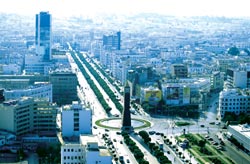The development of communication technologies in Tunisia
National strategy
Tunisia has adopted a fourfold strategy to develop communication technologies
in line with the concepts that lay behind the offer the country made in 1998 at
the Plenipotentiary Conference of the International Telecommunication Union in Minneapolis
to host the World Summit on the Information Society.
The first part of the strategy is to develop, modernize and implement new technologies
for a communication infrastructure that can meet the needs of an increasingly knowledge-oriented
economy. In particular, it is intended to upgrade and extend the fixed and mobile
telephone infrastructure and develop data transmission networks, making use of emerging
new technologies.
Next, the institutional and regulatory framework will be strengthened, with a
view to consolidating the opening of the sector to competition, reinforcing the
regulatory function and fostering the participation of private-sector operators.
|

Alain Denize
Habib Bourguiba Avenue in Tunis
|
|
Capacity building in technology and engineering will be strengthened by bolstering
research, university education and continuing education, and by broadly promoting
digital literacy, to lay the foundation for the information and knowledge society.
Finally, the development of the private sector with innovative, competitive and
high value-added companies with the potential to be true global players will help
to make Tunisia a regional centre for technological innovation and excellence.
Achievements so far
Institutional and regulatory framework
To organize the telecommunication sector and consolidate its opening to the private
sector, a new telecommunication law has been adopted and a regulatory body set up.
A regulatory framework has also been created for the telecommunication sector, and,
in February 2004, a law was adopted on information security, under which the national
information security agency ANSI was set up.
 Liberalization of the telecommunication sector Liberalization of the telecommunication sector
The main achievement has been the opening of the Tunisian telecommunication market
to competition, with an initial licence being awarded for the installation and operation
of a public digital mobile telephony network, and a second licence being issued
for a public data transmission network by satellite VSAT. The status of the national
regulator has been changed from a non-administrative public entity to a share corporation.
Telecommunication infrastructure
Tunisia has installed a modern telecommunication network, with seven national
hubs equipped with high-speed multiservice exchanges handling telephone, Internet
and multimedia traffic. The network links up to domestic regional networks that
are designed to provide optimum services for the major urban centres and zones of
economic activity. The telephone network is entirely digital, with 100 per cent
coverage of the country. By the end of 2004 there were:
- 1 204 000 fixed subscribers,
- 3 736 000 mobile subscribers,
- two mobile telephony operators (Tunisia TÚlÚcom and Tunisiana),
- rural telephony: WLL and MobiRif technology (GSM standard),
- two international gateways: submarine cables, digital satellite links,
- 10 500 public telecommunication centres throughout Tunisia.
Tunisia participates in satellite telecommunication projects such as Thuraya,
a project for the Arab world, RASCOM, a project for Africa, and SEAMEWE4 at the
global level. The objective is total connectivity.
Internet and data communication
 The Internet is available throughout Tunisia via 12 Internet service providers
(seven public and five commercial). Voice over Internet Protocol (VoIP) technology
has been introduced on the international network. There is also a commercially operated
satellite VSAT data communication network. The Internet is available throughout Tunisia via 12 Internet service providers
(seven public and five commercial). Voice over Internet Protocol (VoIP) technology
has been introduced on the international network. There is also a commercially operated
satellite VSAT data communication network.
Digital literacy
The office of the president initiated a “family PC” campaign in April 2001. This
provided targeted assistance for low-income households. By the end of 2004, 42 520
computers had been acquired in this way. Tunisian households can obtain Internet
access at a monthly cost of ten dinars, including 15 hours of surfing. A mobile
education unit called “Le bus 7 Novembre de l’Internet” toured 170 establishments
from 2002 to 2004, bringing the campaign to over 10 000 people.
Prospects
Building on the achievements of more than a decade of consistent policy work,
Tunisia is moving into a new phase, with a strategy and programme encompassing the
following points.
- A promising telecommunication infrastructure: 80 per cent teledensity in 2009;
Internet connectivity in every region of the country; progressive adoption of ADSL
for Internet access.
- Digital opportunities for all, regardless of geographical location: This part
of the programme envisages that the number of computers in use will reach one million
by 2009, with an e-mail address available for every person, a Publinet Internet
centre in every village, continuation of the “family PC” programme to reach 16 per
cent of all households, and reduced network access rates for the Publinet centres
in rural areas.
- A more dynamic civil society that is more actively involved in promoting digital
literacy in the knowledge-based society: The programme will create incentives for
new organizations to be established to help promote digital literacy, and provide
free hosting services for organizations that wish to set up a website offering Tunisian
cultural, educational, scientific or recreational content.
|


